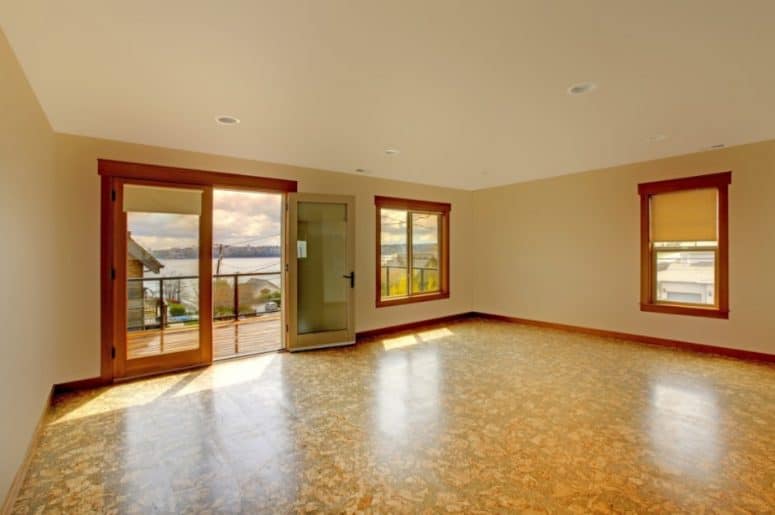The basement poses the highest risk for moisture-related issues such as mold growth and potential flooding. Being located below ground level, the basement is susceptible to water intrusion through various means.
Even in dry weather conditions, moisture can still accumulate in the basement, leading to the growth of mold and creating an uncomfortable environment.
It is crucial, therefore, to select the appropriate flooring for your basement to mitigate water access and prevent any residual effects that may cause discomfort for you and your family.
Things to Consider Before Choosing Basement Flooring
The basement is typically located below the main living area of a house, which makes it a below-grade space. However, being below-grade does not imply inferior quality or cheapness; it simply refers to its position relative to the ground.
The term “below-grade” is commonly used by professionals in the construction industry to describe flooring options suitable for rooms situated below ground level, such as basements.
When selecting below-grade flooring, there are several important considerations to keep in mind. One key factor is that this type of flooring is installed close to the ground, making it more vulnerable to issues like mold growth, water flooding, and moisture seepage from the ground. Therefore, it is essential to choose flooring materials that can withstand these challenges.
Opting for synthetic materials rather than organic or natural ones is recommended, as organic materials are prone to rotting when exposed to water and can facilitate mold growth. Synthetic materials, such as vinyl flooring, offer better resistance to decay. Additionally, choosing a one-layer flooring option simplifies installation and maintenance, reducing the risk of water damage.
Some below-grade flooring may require installation on a subfloor, while others can be placed directly on a concrete slab. This article will explore these considerations for each flooring type suitable for basements.
Keep in mind that each flooring type has its own unique conditions and requirements that should be carefully considered before determining the best flooring option for your basement.
Best Flooring Options for Basement
Having familiarized yourself with the fundamental aspects of selecting below-grade flooring, you should now approach the task of choosing the best flooring type for your basement with careful consideration.
Every homeowner utilizes their basement differently. Some may transform it into a guest room, while others may prefer it as a recreational area, a children’s playroom, or even a functional workspace. These diverse purposes necessitate varying types of flooring.
It is crucial, therefore, to pay close attention to which flooring option aligns most effectively with your specific requirements for the basement. To assist you in making an informed decision, here is a curated list of the best flooring options for your basement.
1. Vinyl
Vinyl flooring offers three distinct forms: sheet, plank, and tiles. Each of these forms has its own unique characteristics, resulting in different advantages and disadvantages when it comes to basement installations.
To provide a comprehensive understanding, we will discuss each form separately, delving into their specific features and considerations.
a. Vinyl Sheet
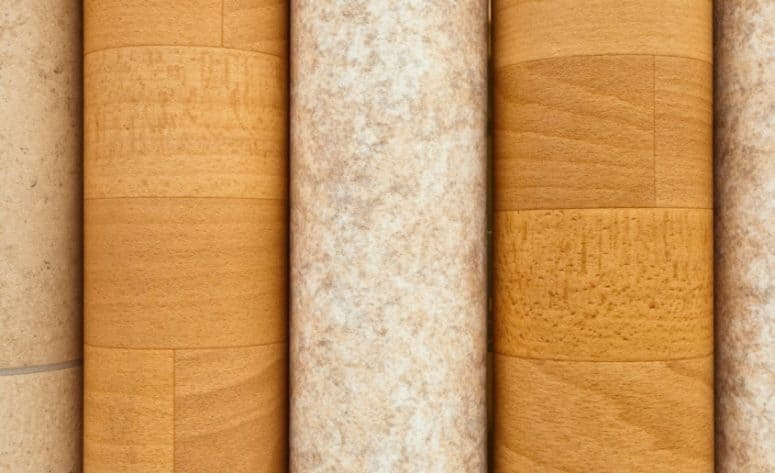
Sheet vinyl is a trusted and popular flooring option, particularly for areas with high moisture levels such as basements. It is known for its exceptional waterproof properties, making it an ideal choice for damp spaces. Additionally, sheet vinyl offers a seamless appearance, unlike tile vinyl that may have visible seams between tiles once installed. This seamless quality contributes to effective protection against moisture in your basement.
Furthermore, sheet vinyl offers a wide range of design options, allowing you to select a style that suits your preferences and aligns with the purpose of your basement. Another advantage is that sheet vinyl is relatively affordable compared to other types of flooring.
However, it’s important to note that installing sheet vinyl is not as DIY-friendly. Professional treatment and floor preparation are necessary to achieve optimal results. Without proper floor renovation and surface smoothing, the sheet vinyl may not provide balanced coverage, resulting in an uneven feel underfoot. Therefore, it is crucial to ensure proper installation to avoid any discomfort in your basement.
b. Vinyl Plank or Tile
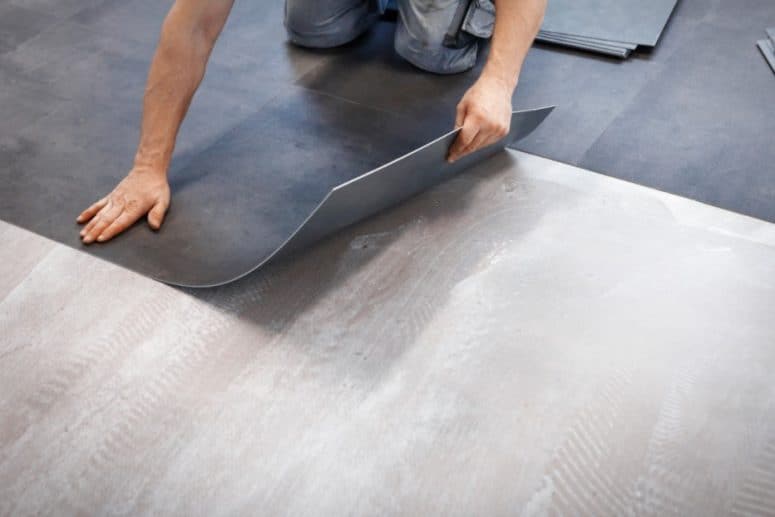
Both plank vinyl and tile vinyl share similar characteristics but differ in their sizes. Despite their differences in size, their layers and compositions remain the same, which is why I will discuss them together.
Plank vinyl and tile vinyl have evolved into newer forms known as Luxury Vinyl Plank (LVP) and Luxury Vinyl Tile (LVT). These options are highly recommended for any room and purpose.
If you are seeking waterproof flooring that is visually appealing, LVT and LVP are the perfect choices. Both LVT and LVP are 100% waterproof, capable of withstanding water flooding and heavy moisture.
Moreover, they offer a wide range of designs that closely resemble natural materials like wood or stone.
The installation process for LVT and LVP is relatively straightforward, typically requiring an underlayment for the floating floor method. However, if you intend to install them directly on a concrete slab, it is important to use a vapor barrier before laying down the vinyl flooring.
This precaution is necessary because there may be hydrostatic pressure during certain seasons, such as the beginning of spring when melting snow and increased water intensity in the ground could lead to water seepage. Trapped water between the vinyl flooring and the base floor creates an unfavorable environment, promoting the growth of dirt and bacteria that can cause unpleasant odors and potential health issues in the basement.
2. Engineered Hardwood Flooring
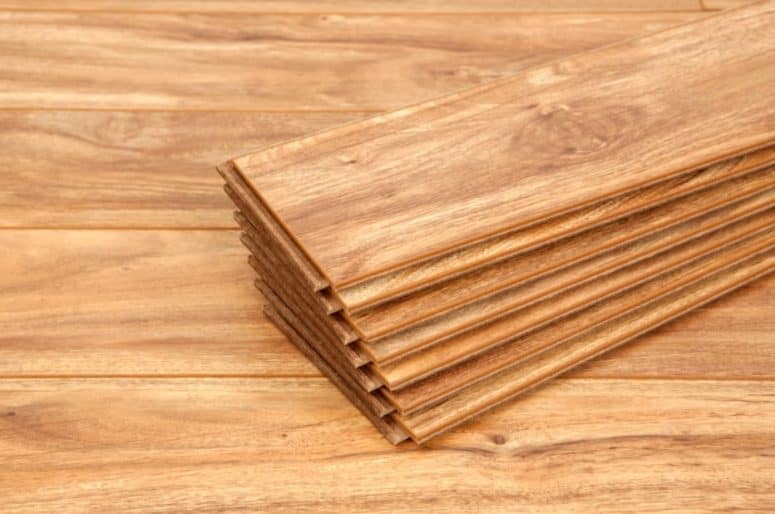
3. Rubber Flooring
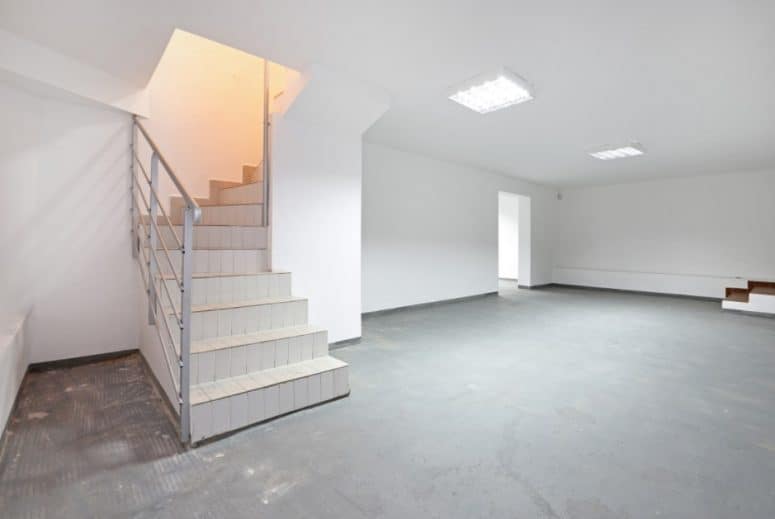
4. Ceramic Tile
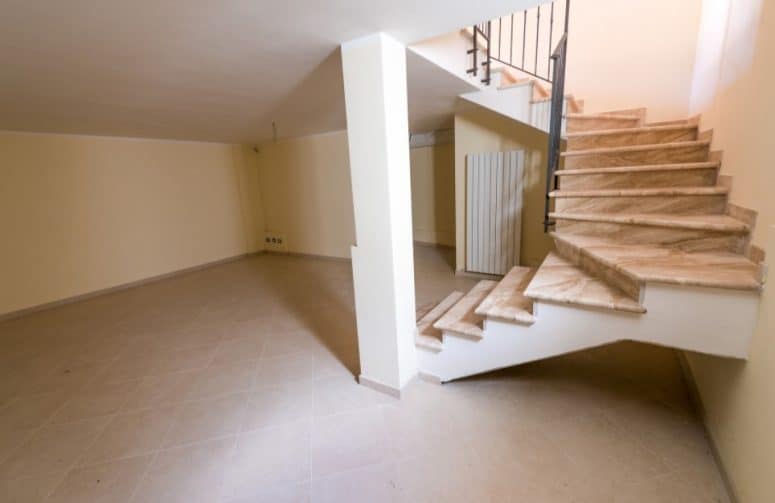
Ceramic tile offers two main options: glazed and unglazed. Glazed tiles have a glossy and shiny appearance, while unglazed tiles have a more natural and earthy look. Both options are highly durable and, most importantly, waterproof.
Ceramic or porcelain tile flooring is designed to withstand significant water exposure. Even in the event of flooding, the tiles will not crack or break, and the underlying floor will remain unaffected. This makes ceramic tile flooring an excellent choice for basements where moisture and mold can be concerns.
When installing ceramic tile flooring in a basement, it can be directly laid on a concrete slab, preferably using cement to minimize grout issues. However, it is crucial to ensure that the surface is well-prepared and level. Uneven surfaces can cause the tiles to crack, leading to sharp pieces that pose a danger. Therefore, it is recommended to have a professional handle the installation rather than attempting it as a DIY project, especially for beginners.
While ceramic tile flooring is highly water-resistant, its hard surface can feel cold, especially in a basement that tends to be cooler. If you plan to use the basement as a family or children’s space, you may want to consider installing radiant heat below the tiles on the concrete slab to mitigate the cold sensation when walking barefoot.
One thing to note is that ceramic tile flooring can be noisy due to its hard surface. Every step may produce a significant noise, which could be a consideration depending on your preferences and the purpose of the basement space.
5. Concrete Flooring
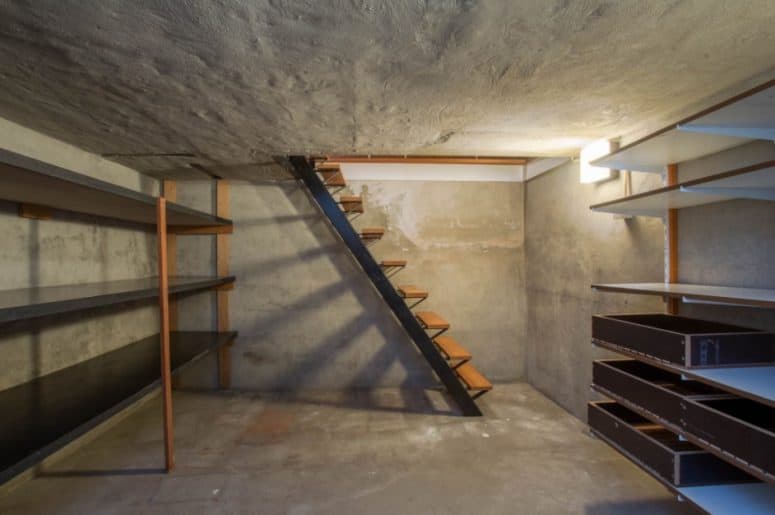
Concrete flooring offers a unique and versatile option for basement flooring. Unlike ceramic tile, concrete is a raw material that provides a distinct aesthetic appeal. Many people find concrete flooring to be an attractive choice for their basements.
However, installing concrete flooring can be challenging to do alone. It typically requires assistance from one or two additional individuals to ensure a smooth and level installation. Extensive patching is often necessary to achieve the desired finish, and it is common to paint the concrete floor to cover any marks from the patching process.
One of the advantages of concrete flooring is its resilience to moisture, water floods, and mold. Basements are prone to high levels of moisture, making concrete flooring an excellent choice as it can withstand these conditions due to its raw composition.
While concrete flooring is suitable for basements, it is important to note that it is not a sound-absorbing material. In a closed and private space like a basement, footsteps on concrete flooring can be quite noisy. This might not be ideal if you plan to use your basement as a home cinema or a space where noise reduction is crucial.
6. Cork
